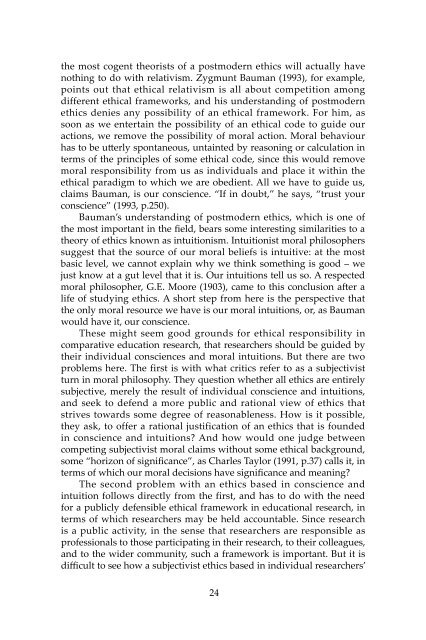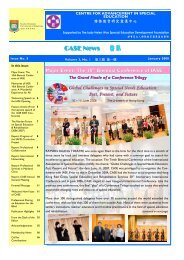Comparative Education Bulletin - Faculty of Education - The ...
Comparative Education Bulletin - Faculty of Education - The ...
Comparative Education Bulletin - Faculty of Education - The ...
You also want an ePaper? Increase the reach of your titles
YUMPU automatically turns print PDFs into web optimized ePapers that Google loves.
the most cogent theorists <strong>of</strong> a postmodern ethics will actually have<br />
nothing to do with relativism. Zygmunt Bauman (1993), for example,<br />
points out that ethical relativism is all about competition among<br />
different ethical frameworks, and his understanding <strong>of</strong> postmodern<br />
ethics denies any possibility <strong>of</strong> an ethical framework. For him, as<br />
soon as we entertain the possibility <strong>of</strong> an ethical code to guide our<br />
actions, we remove the possibility <strong>of</strong> moral action. Moral behaviour<br />
has to be utterly spontaneous, untainted by reasoning or calculation in<br />
terms <strong>of</strong> the principles <strong>of</strong> some ethical code, since this would remove<br />
moral responsibility from us as individuals and place it within the<br />
ethical paradigm to which we are obedient. All we have to guide us,<br />
claims Bauman, is our conscience. “If in doubt,” he says, “trust your<br />
conscience” (1993, p.250).<br />
Bauman’s understanding <strong>of</strong> postmodern ethics, which is one <strong>of</strong><br />
the most important in the field, bears some interesting similarities to a<br />
theory <strong>of</strong> ethics known as intuitionism. Intuitionist moral philosophers<br />
suggest that the source <strong>of</strong> our moral beliefs is intuitive: at the most<br />
basic level, we cannot explain why we think something is good – we<br />
just know at a gut level that it is. Our intuitions tell us so. A respected<br />
moral philosopher, G.E. Moore (1903), came to this conclusion after a<br />
life <strong>of</strong> studying ethics. A short step from here is the perspective that<br />
the only moral resource we have is our moral intuitions, or, as Bauman<br />
would have it, our conscience.<br />
<strong>The</strong>se might seem good grounds for ethical responsibility in<br />
comparative education research, that researchers should be guided by<br />
their individual consciences and moral intuitions. But there are two<br />
problems here. <strong>The</strong> first is with what critics refer to as a subjectivist<br />
turn in moral philosophy. <strong>The</strong>y question whether all ethics are entirely<br />
subjective, merely the result <strong>of</strong> individual conscience and intuitions,<br />
and seek to defend a more public and rational view <strong>of</strong> ethics that<br />
strives towards some degree <strong>of</strong> reasonableness. How is it possible,<br />
they ask, to <strong>of</strong>fer a rational justification <strong>of</strong> an ethics that is founded<br />
in conscience and intuitions? And how would one judge between<br />
competing subjectivist moral claims without some ethical background,<br />
some “horizon <strong>of</strong> significance”, as Charles Taylor (1991, p.37) calls it, in<br />
terms <strong>of</strong> which our moral decisions have significance and meaning?<br />
<strong>The</strong> second problem with an ethics based in conscience and<br />
intuition follows directly from the first, and has to do with the need<br />
for a publicly defensible ethical framework in educational research, in<br />
terms <strong>of</strong> which researchers may be held accountable. Since research<br />
is a public activity, in the sense that researchers are responsible as<br />
pr<strong>of</strong>essionals to those participating in their research, to their colleagues,<br />
and to the wider community, such a framework is important. But it is<br />
difficult to see how a subjectivist ethics based in individual researchers’<br />
24
















